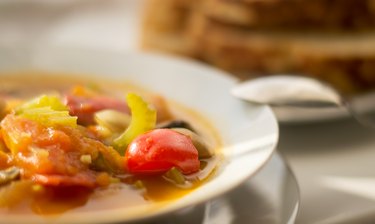
The Taoist diet is based on eating locally-grown organic produce in season when possible and avoiding acidic foods, artificial food additives, heavily processed foods and those difficult to digest. Emphasis is placed on whole grains, fruits, vegetables, seeds, nuts, soy products and warm, cooked food. Foods to be avoided as much as possible include red meat, refined foods, tropical fruits, dairy products, sugar, strong spices and cold foods.
Emphasis on Whole Grains
Video of the Day
The Taoism diet consists of 50 to 70 percent whole grains, 20 to 30 percent vegetables and 5 to 10 percent animal or bean products, according to Grand Master Mantak Chia, founder of Universal Healing Tao. Products that contain little or no nutritional value are avoided, such as refined white flour products and sugar. Sweetness necessary to harmonize with the other four tastes -- salty, sour, bitter and pungent -- is obtained from the sweet flavor of grains which improves digestion and gathers energy inward, according to Shashi, a Universal Healing Tao Instructor. Brown rice in the Taoist diet, however, is not for children nor the elderly who cannot digest it, nor for the advanced Qigong practitioner who is too filled with Qi energy to eat grains, according to Qigong Master Qinyin.
Video of the Day
Locally Grown Fruits and Vegetables
Organic fruit locally grown and seasonal vegetables are important in a Taoism diet. Plums are favored as well as cabbage and root vegetables such as turnips, beets and rutabaga which add sweetness to the diet. Tropical fruits with the exception of papaya are avoided because they are considered too acidic. Most other fruits and vegetables are prized because of the anti-oxidants they contain which Taoists believe slow the burn rate within cells to an optimal mid-level burn rate. Because too many fruits and vegetables daily are believed to raise the burn rate, they are restricted to 20 to 30 percent of the daily menu. Pineapple, grapefruit and oranges should accompany most meals, according to Mantak Chia, because they aid in digestion.
Steamed and Stir-Fried
Food in the Taoist diet is cooked by steaming or stir fry using corn, safflower or soy oils and must remain crisp. Olive oil is considered too heavy for cooking but is used in salads. Food that is cooked and served warm such as soups, casseroles and stews are preferred over cold or raw foods and drinks, with the exception of salads.
Avoiding Hard-to-Digest Foods
Dairy products, cheese, red meat which all contain saturated fat and citrus fruits are considered difficult to digest and are avoided. Occasionally steamed white meat and fish is eaten but purely vegetarian meals are recommended. Cheese and sweet desserts are believed to slow the circulation of energy in the body and make it sticky and unclear. Spices are rarely used because they, too, are considered hard to digest. Broth made with chicken bones are given to babies instead of milk, according to Mantak Chia, and green leaf vegetable broth and seaweed soups are substituted for milk in cooking.